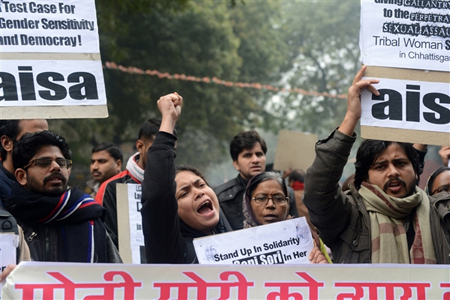
New Delhi, Jan 6: A brother of the Delhi gang-rape victim has lambasted politicians for their controversial remarks and analyses of a spurt in rape cases and added that such absurd comments will only encourage rapists.
“The remarks reflected that the politicians and leaders also think like policemen. The police also ask a number of questions when someone approaches them to lodge a report of rape. They also give sermons in morality,” the disgruntled brother said.
He said the delay in admitting his sister to hospital claimed her life. “My sister had worn an overcoat on the day she was raped in the bus. She was dressed properly. Then why was she targeted?” her brother questioned. “Their
remarks will only embolden the rapists,” he told Deccan Herald.
RSS chief Mohan Bhagwat had raked up a controversy with his assertion that rapes were a fallout of western culture permeating Indian society and excessive urbanisation. “Such cases hardly take place in Bharat (rural India), but frequently in India (urban parts),” Bhagwat had said.
The victim’s brother also claimed that his sister would have survived had she received medical help on time.
“The passers-by did not extend any help to my sister after she was thrown out of the bus.”
He also expressed displeasure over the lack of consensus on awarding death penalty to rapists. “Hopefully in my sister’s case, the culprits will get death sentence,” he added.
Police deny allegations
Meanwhile, the Delhi Police on Saturday denied allegations levelled by the male friend of the gang-rape victim of tardy response given by police control room vans, saying a PCR van attended the duo within seven minutes of the distress call.
According to Vivek Gogia, joint commissioner of police (south-western range), two PCR vans rushed to Mahipalpur after information was received at 10:21 pm.
The position of the PCR vans ascertained through logs generated by global positioning system have also been released.
“The PCR?vans are equipped with GPS?and they are connected to the control room at the headquarters. We maintain logs of PCR van positions and it contrasts the friend’s claims,” said Gogia.
Logs show that two PCR vans, E-47 and Z-54, reached the spot at 10:27 pm and 10:29 pm respectively. Accordingly, the 23-year-old para-medical student and her 28-year-old software engineer friend were taken into Z-54 van which left the spot at 10:39 pm.
“They were taken to Safdarjung Hospital which was the nearest multi-disciplinary government hospital where medico-legal cases are referred to,” Gogia added.
The PCR?van reached Safdarjung Hospital at 10:55 pm, and the victims were handed over to the hospital staff. The PCR vans are said to have been stationed beneath the flyover at Mahipalpur that connects Delhi to Gurgaon.
It is, however, pertinent to mention that the PCR van took 12 minutes to leave the spot. Another 16 minutes were taken to reach Safdarjung Hospital at Safdarjung Enclave, 13 km from the spot, when Fortis Hospital in Vasant Kunj could have been reached within five minutes. Gogia defended that there are notified designated multi-disciplinary government hospitals where victims of medico-legal cases are taken.
The gang-rape victim’s male friend, the lone witness to the crime, broke his silence on Friday over what had happened on December 16 night. He alleged that the PCR?vans arrived 30-45 minutes after the two victims were dumped at Mahipalpur and police personnel wasted time in deciding over the jurisdiction of police station.
Narrating the sequence of events, he said the PCR?vans took over two hours to take them to Safdarjung Hospital.
“Three PCR vans came, but none helped us. Police personnel kept on debating the jurisdiction of the police station that controlled the area where we were dumped. As we were naked, we kept requesting them for clothes, but the PCR staff continued to argue over the jurisdiction,” he alleged.
Gogia, however, said there was no issue over jurisdiction of the case as PCR vans do not operate under police stations and their operation is regulated by control room at police headquarters. “The PCR vans are not concerned with jurisdiction, as they move or respond to distress calls irrespective of their jurisdictions,” he said.
He also insisted that the male friend was made part of the investigation after being discharged from Safdarjung Hospital after first aid treatment was given within a few hours. Gogia apparently refused to comment on the claims that the male friend, not cops, took the woman inside the PCR van.
The police have already filed a criminal case against Zee News channel for disclosing the identity of the male friend. According to Delhi Police spokesperson Rajan Bhagat, a case under Section 228 A of the Indian Penal Code has been filed with Vasant Vihar police station. It bars disclosing the identity of the victim of certain offences.
Gogia further said the male friend’s interview was unlikely to affect the case.





Comments
Add new comment